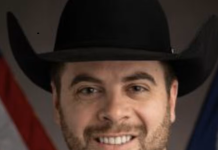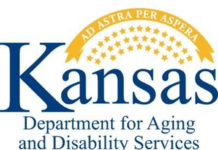Editor’s note: This is the first of two interviews with lawyers who are intimately involved in legal cases that are shaping public policy in Kansas on both sides of the political spectrum. Today, we publish our interview with Sharon Brett, legal director of the American Civil Liberties Union of Kansas. Tomorrow, we will publish our interview with Dan Burrows, who is new to Kansas politics as a top deputy for Kansas Attorney General Kris Kobach.
Sharon Brett could have done many things.
In high school, she considered theater.
Later in college, she considered social work.
Ultimately, she settled as the legal director for the American Civil Liberties Union of Kansas where she tries cases that influence state public policy.
While she might not necessarily be a political insider in the traditional sense, the cases that Brett tries shape state policy, whether it’s elections, open records, criminal law, corrections or how traffic laws are carried out on state highways.
We recently sat down with Brett for a lengthy interview where we got to learn a little more about the lawyer whose organization has often been a foil for Kansas Attorney General Kris Kobach in the political arena.
The University of Michigan graduate walks us through her career, which included work as a law clerk for a federal magistrate, a senior staff attorney at the Criminal Justice Policy Program at Harvard Law School and as a lawyer at the U.S. Justice Department.
She discusses how her work at Justice honed her legal skills and how she led the investigation of excessive force at the Chicago Police Department at the end of President Barack Obama’s administration.
She talks about her ups and downs at the ACLU, her relationships with the secretary of state’s office and the attorney general’s office as well as her thoughts about the complexities of Kansas.
We left her quotes intact, although some of the interview was edited for clarity and brevity and in some cases biographical information was paraphrased.
How did you get to Kansas?
“My family relocated here during the pandemic in July of 2020. The ACLU happened to be hiring, and it was a natural fit for the background of litigation work I had been doing previously. I reached out and applied and got the position.
“The ACLU was the first place I interned as a law student, so it seemed like a natural home and fit for me to come to as a attorney.”
Where you from originally?
“I’m originally from Chicago and then New Jersey. I went to school in Michigan for undergraduate, moved to D.C. after my undergraduate degree, worked there for about four years then went back to Michigan for law school and moved back to D.C. after law school.”
Why Michigan?
“A great football team? No. It was a great institution that had the right combination of what I was looking for as an undergraduate. I really enjoyed my time there. The law school had a lot to offer professionally and personally. I think the Ann Arbor community is wonderful. It’s very similar to Lawrence in the sort of college-town way. It was a great place to get an education and sparked my interest in the work that I’m doing now.”
Undergraduate education
and a possible theater career
“I went to a really large high school and liked the large learning environment and the large student body and the opportunities that it afforded. When I went to apply for colleges, I applied to quite a few large state schools – that was just the environment I thought I could have the largest number of opportunities available to me. I wasn’t exactly sure what I was going to do with my undergraduate degree.
“I applied to probably seven or eight colleges and seven of the eight were for stage management and theater production. I was a musical theater kid in high school and thought I was going to go to Broadway and be in musical theater as an adult. And the one school that I didn’t apply to that program for was Michigan.
“I did apply for this special program at Michigan called the residential college, which is a small liberal arts schools within the larger University of Michigan. I liked that program. It combined the benefits of a small liberal arts learning with a large research institution. It also had a complex foreign language requirement so I had to take very intensive Spanish my first two years, sit at Spanish-speaking lunch tables and go to Spanish coffee hours. It had this real immersion feel to the program, which I was really interested in.”
An interest in criminal justice reform
and law school
“I took a class my sophomore year at the University of Michigan in the psychology department that made me really start to think about wanting to do psychology as a career. I really enjoyed my classes in that department. In my junior year of the fall semester, we had to take what they called a community-based lab. We had to go to a seminar, but we were placed as volunteers in different lab settings.
“The lab section that worked the best for my schedule with my other classes placed me in a juvenile detention facility. I worked with group of about 15 young men who were transitioning from a maximum security correctional facility back to society. It was sort of a halfway house where they could have increased responsibilities and freedoms and they were learning life skills to transition back to the community.
“The seminar component of that class was on problems with the juvenile justice system. That is really what sparked my interest in doing criminal justice reform work. I got very heavily involved in a program at Michigan called the prison creative arts project that did arts workshops inside correctional facilities. They did everything on poetry and creative writing to visual arts to theater.
“My mentor in that program – Buzz Alexander who ran that (program) and was a professor of English at the University of Michigan – really sort of opened my eyes up to a lot of the injustices of the people that we were working with faced in the system. That’s what sort of set me on the path that eventually led to law school.”
Law school influence
“I was sort of the rare person in law school who went to law school knowing exactly what I wanted to do and where I wanted to work. Most people who go to law school don’t have that clarity at the outset. I was fortunate to have that and it really drove what I ended doing up with those three years in law school. It really focused me on specific classes, the internships that I wanted to take on as a law student, who I decided to connect with in terms of professors that could serve as mentors and role models for me in my career. I did a lot of clinical and experiential work when I was in law school because I was really ready to start practicing. I knew what I wanted to do and I just wanted to learn how to do it.”
Learning from a federal magistrate
Brett worked as a law clerk for John M. Facciola when he was magistrate judge on the U.S. District Court for the District of Columbia, someone she admired as a lawyer and a jurist. She said he was an “incredible mentor” to her early in her career. “I learned a lot about the courtroom processing and what it’s like to have to convince somebody of the answer to a legal question who might already have their own ideas of what that answer might be. It’s really your first opportunity as a practicing lawyer to try to be persuasive and do so in a space that there’s a lot of respect and mutual admiration for one another. I am really thankful for time I spent in his chambers.”
Justice Department: Learning to be a lawyer
Brett’s career included work in the civil rights division of the U.S. Department of Justice during former President Barack Obama’s administration. She joined the agency through the attorney general’s honor program, something she described as an entryway for young attorneys at the Justice Department. Her work focused on prisons and jails. It was here where Brett said she learned how to be a lawyer in an environment where junior attorneys are handed a lot of work and responsibility and need to learn quickly.
Her work at Justice included serving as the lead investigator for the agency in its investigation of the Chicago Police Department. Justice issued a report in 2017, concluding that the Chicago Police Department for years had engaged in excessive force and killing people who didn’t pose a threat.
“I learned what litigation takes, the tremendous power that attorneys have to represent the rights of people who often are not listened to by the courts or not heard by the courts. I was doing this work on behalf of the United States. There was incredible power and weight in that, saying on behalf of the United States that the conditions of these prisons and jails are unacceptable and inhumane or what this police department doing to the public that is racist or abusive. That was the position of the United States. That wasn’t the position of Sharon Brett, the attorney. There was a lot of responsibility in that.
“I learned how to put together a case. I learned how to take something that is just a news article, explaining a one-off issue and investigate whether there is actually a broader pattern behind what’s being described in that news article and if there is, how to put together a legal case to prove that. I learned how to negotiate, how to work with people across the aisle and on different sides of the political spectrum.
“As a young, female attorney at the Department of Justice, I was on the other side of the negotiating table from police chiefs with 30 or 40 years of experience on the force, how to earn their respect, how to make sure they listened to me and understood that I knew what I was talking about and had a right to be at that table, too.”
Chicago police investigation
“We worked very hard to get out our findings report of the Chicago Police Department before the change of administrations. I am most proud of the work that went into that given the truncated timeline and had given birth that summer. I was supposed to still be on maternity leave when all of that was happening. It was a lot of work that I got done when my firstborn was three months old at the time. I am very proud of that work.”
How has the Justice Department work
influenced your ACLU work?
“I think it’s given me some confidence that I know what I’m doing, that I have experience. I think I have more experience and knowledge in the issues I’m litigating and the way to litigate them properly than I get credit for based on my age. I know what I bring to the table on behalf of my clients. I think the formative years I spent at DOJ learning how to do that, training with some of the best attorneys in the country really laid the foundation for me to be successful in this job.”
Motivations
“Kansas is a complicated state. I think it’s a much more complicated state than people on the coasts realize. Politically, I think the people here are really fighting for their communities every single day and truly trying to be agents for change in the state. I find a lot of motivation in that. My colleagues and the clients that I work on behalf of and the other attorneys and organizations that I partner with, there are a lot of people here doing incredible work in trying to push a boulder up a hill. It’s really motivating to be part of that.
How is Kansas complicated?
“I think that people on the coasts think of Kansas as a deeply red state and that people here are opposed to many of the issues that the ACLU stands for or positions that the ACLU stands for. I actually don’t think that’s the case. I think when you get out in the community and you talk to people, I think a lot of people here want the same thing. It’s a lot more complex and a lot more nuanced of a place than the rest of the country might give it credit for.”
How do you feel when the attorney general
uses the ACLU as a political foil?
“If he wants to use us as a target for that attack, he’s perfectly able to do so. That’s his right. I wish that this was less about attacking us as an institution and more about engaging with the desires of the communities and the constituents that he represents, which I think the ACLU also represents.”
What is your relationship
with the secretary of state’s office?
“We have quite a positive relationship with the secretary of state’s office. That doesn’t mean that we agree on everything or have the same opinions about the right course of action. There’s also a number of instances where we’ve collaborated really effectively.
“I think one of the prime examples of that is our statewide voter protection program. We do that with the cooperation of the secretary of state. And that’s really meaningful, because it’s a recognition that what we are trying to do is help voters vote. That is the same thing that the secretary of state wants. Voters should be able to cast their ballot, and that’s what our voter protection and election protection program is doing.
“We’ve been opposing parties in court, and will continue to be opposing parties in court where we differ on the issues and the constitutionality of actions taken by the secretary of state. But I think there’s an implicit recognition that you don’t have to agree on substance at every point in the process in order to work collaboratively where there is an agreement.
“It’s important to differentiate between policy disagreements and unprofessionalism. I’ve been met with professionalism by the legal department for the secretary of state’s office at every turn. We won’t always agree, but we treat each other with respect. There’s no gamesmanship there.”
Your relationship with
the attorney general’s office?
“It’s still developing. Obviously, it’s a new office and new leadership’s there. My hope is that the relationship continues to be professional as it’s been so far.”
Not unreasonable
“I have heard other people describe me as a zealous advocate for my clients and for the issues that the ACLU represents, but I am not inherently an unreasonable person. That’s how I try to conduct myself in my relationships with opposing counsel in all my cases. I am certainly going to advocate for my clients. But I think that people would find that I am very reasonable to work with.”
Your most frustrating time
at the ACLU?
“Certainly, the Kansas Supreme Court’s opinion in the redistricting case was one of the bigger disappointments that I’ve had. It’s not the result that we wanted or that our clients wanted. That was a big loss, and there was a lot of effort put into that case and a lot of people were counting on us. When you lose a big case like that, you can’t help but feel like you let the community down. That was a particularly challenging time.”
Your biggest success?
“The order that we got recently this year in the Highway Patrol litigation was a real testament to the cases that we put on this winter and spring and the work that’s gone into that litigation over the last three years.”
Did you have trepidation
replacing Lauren Bonds as ACLU legal director?
Brett replaced Lauren Bonds, who had been credited with helping to build the ACLU of Kansas into legal force in the latter part of the last decade, including the successful challenge of the state’s proof-of-citizenship requirement for registering to vote. “Of course, those are big shoes to fill. There’s always anxiety when you take over for somebody who is so magnificent that you want to be able to live up to the standards that they set for the office. She and I continue to collaborate on projects. We’re cocounseling on a case together right now. I hope I’ve been able to do justice to the position in a way that she did.”
How do you enjoy teaching?
“I love being able to teach the students at KU, and the class that I teach there on social justice lawyering has been really interesting and really energizing for me to work with young students who are interested in going into this line of work.”













